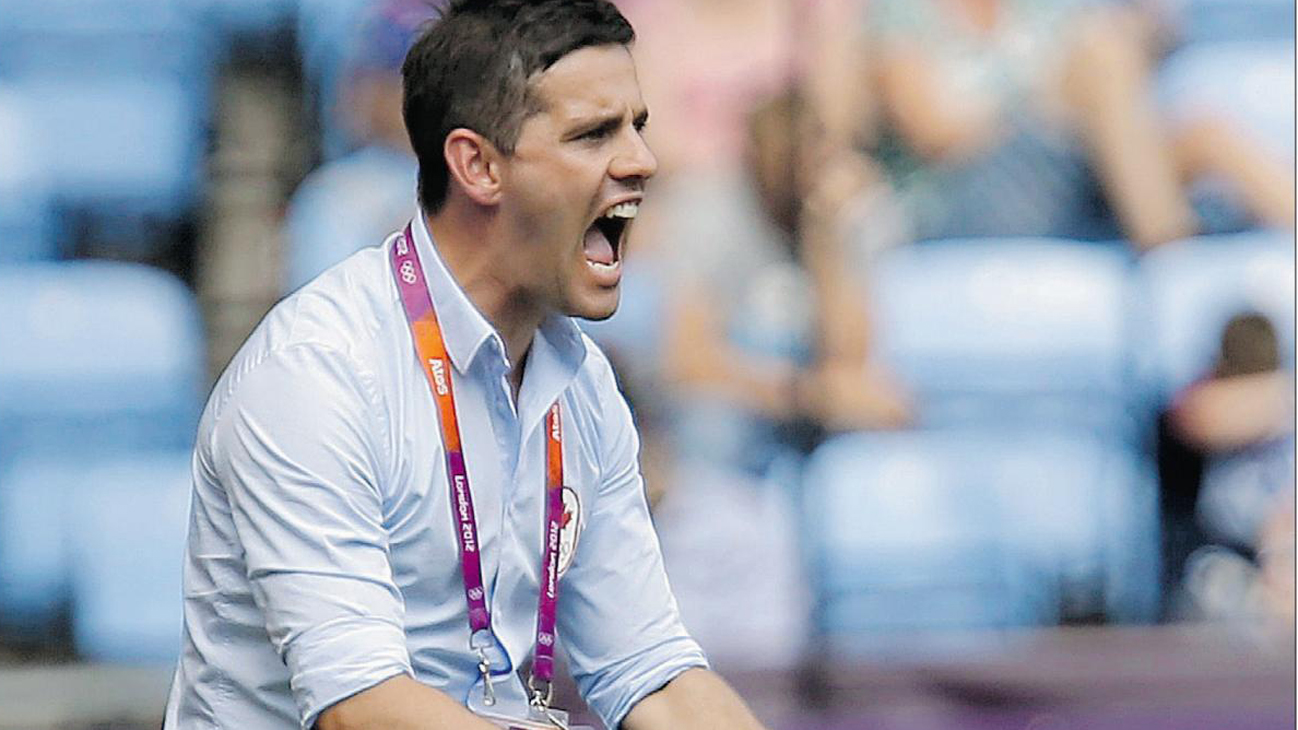John Herdman took a team once called a “struggling squad” to one that captured the hearts and minds of Canadians when they captured the bronze medal at the 2012 Summer Olympic Games in London. As head Coach of the Canadian Women’s Soccer Team, and a nominee for the 2012 FIFA Coach of the Year Award, John stresses the importance of developing a high performance culture, learning to overcome adversity with grace, and the role of leaders to inspire trust, confidence, and success, whether it’s on the field, in the workplace, or in the home. Currently acting as an analyst with CBC Sports during their coverage of the World Cup, The Vancouver Province also tipped their hat to John with this glowing article on his career with the Canadian Women’s Team thus far:
When John Herdman’s name surfaced in connection with the British women’s soccer team last summer, the presumption in Canada was, well, it was fun while it lasted.
Herdman had taken over a broken Canadian women’s team in 2011 and led them to a bronze medal at the 2012 London Olympics, but the lure of returning to his homeland had to be too great to resist. Right? This is the way of the game in Canada and no-fair-minded person would have begrudged Herdman the chance to return to a place where soccer is king.
“If they say, ‘We need your help,’ I’m going to consider that,” Herdman said last August.
Now hit the fast-forward button. On Wednesday night, Herdman was patrolling the sidelines at B.C. Place as coach of the Canadian women’s team in an international friendly against Germany. Next year, he’ll be back to lead the Maple Leaf in the Women’s World Cup. His contract also runs through to the 2020 Olympics, which means Herdman has a chance to build something that’s rarer than a unicorn: a Canadian soccer program that is both successful and self-sustaining.
“We got the right guy,” said Canadian Soccer Association president Victor Montagliani from Rio on Wednesday. “It’s not just his coaching ability. He’s building a program here.”
And there’s a real connection to that program.
“When we pull on that jersey, the fight, the spirit is there,” Herdman said in advance of Wednesday night’s game. “It’s part of our DNA and we never want to lose it. But, at the same time, if we want to stay in tune with the modern game, we have to move with the modern game.”
That’s where Herdman comes in. Thankfully.
In a country that’s changed national team coaches more often than some people change their socks, Herdman’s commitment to the women’s program has been a welcome development. He was hired away from New Zealand following a disastrous turn for Canada at the 2011 World Cup and, in the space of a year, qualified the women for the London Olympics, then led them to a bronze medal after a famous/infamous loss to the States in the semifinal.
“That medal was a gold,” said Montagliani.
Still, it is not without consequence. The bronze didn’t exactly diminish expectations for 2015 and the women now enter the World Cup with considerably more pressure than they entered the Olympics. Herdman, moreover, hasn’t helped matters by cheerfully telling anyone with a microphone or a notebook that his team is there to win gold, not aparticipation ribbon.
“In any of these players’ lifetimes, this will never come around again,” he says. “We’ve made it clear. that’s our goal.”
But he also seems to know what buttons to push with his charges and this is part of his master plan. And even if it isn’t, it still makes for good copy. When Montagliani was asked about Herdman’s strengths, he didn’t talk about his tactical brilliance or motivational expertise.
He said simply: “It’s his EQ, his emotional quotient. He knows how to relate to people.”
And he understands the challenge in front of him. His team has resources — the CSA pays the contracts of 14 national team members in the NWSL, which keeps them in North America during the season. It also has one of the best women players in the world in Christine Sinclair. And they’re the Olympic bronze-medal holders and the seventh-ranked team in the world.
We’ll find out what all that means in a year. Right now, it means there are expectations for Herdman and his team.
“We have a foundation and that can be a curse and an opportunity,” he says. “The curse is the expectation of people and we can’t live on (the bronze from London).
“The world has changed. Everyone is progressing. The public has to look beyond (2012) and say, ‘This is a new Canada with a new approach, a new style and a new set of players.’ Even if it’s the same group, they have to be new people. They have to be a different level than they were in 2012.”
Which is a lot to ask. But this is the way Herdman looks at it. If the pressure is greater, so is the reward.

